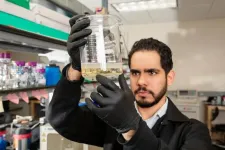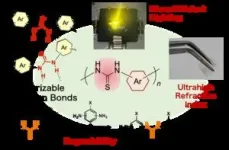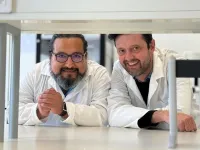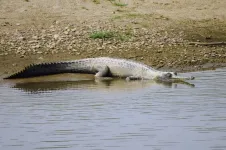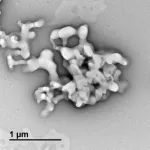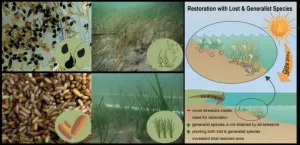(Press-News.org)
EL PASO, Texas (April 30, 2024) – An estimated 168 billion gallons of wastewater — or produced water — is generated annually by the Permian Basin fracking industry, according to a 2022 report by the Texas Produced Water Consortium. The major waste stream has proved both difficult and costly to treat because of the chemical complexity of the water.
In a new study published in the journal Water, researchers at The University of Texas at El Paso have identified a novel means of treating the wastewater generated by oil and gas production: bacteriophages.
Ramón Antonio Sánchez, a doctoral candidate within UTEP’s chemistry program, is the first author on the publication, detailing how bacteriophages, viruses that are often highly specific and lethal to a single species of bacteria, can be used as a rapid and cost-effective method to treat produced water on an industrial scale.
Sánchez said if the work is successful, it would give the oil and gas industry a means of treating, reusing and recycling produced water, rather than the current industry practice of disposing the majority of produced water by injecting it into the ground post oil exploration.
The research focuses on two of the most prominent bacteria found within produced water across the oil and gas industry — Pseudomonas aeruginosa and Bacillus megaterium. P. aeruginosa has the ability to corrode stainless steel and presents a challenge for the longevity of pipelines and other metal-based infrastructure, while B. megaterium, can decompose hydrocarbons — the basis for oil.
Sánchez, along with one of his collaborators, Zacariah Hildenbrand, Ph.D., a UTEP alum, were inspired to use bacteriophages based on their applications in the medical industry, where they are used to combat infections caused by multi-drug resistant bacteria.
“Since the bacteria are living organisms, over time they developed a resistance, in the form of a less penetrable membrane, to traditional disinfectants,” Sánchez explained. “But the bacteriophages, which are viruses themselves, attach to specific receptors on the surface of the host cell and evolve alongside the bacteria they are trying to infect, meaning that any resistance acquired by the bacteria triggers the modification of bacteriophages to keep the infection going.”
The team’s experiments with bacteriophages have been effective, achieving the inactivation of both P. aeruginosa and B. megaterium in laboratory settings. For Sánchez, who graduates this spring with his Ph.D., the work will continue in the industry where his focus will be on replicating his laboratory results out in the field. He will also try to expand the number of microorganisms that can be treated in produced water by securing a larger catalog of bacteriophages.
The team admits the approach does have its challenges. There are currently a limited amount of commercially available Bacteriophages, which is critical since bacteriophages are often highly specific to a single species of bacteria. There are also other species of bacteria in produced water that remain to be tested.
“As UTEP’s status and research prowess nationwide continues to grow, so does its ability to attract talented students like Ramón and provide them with the opportunities to conduct meaningful work that has tangible and tremendous impact,” said Ricardo Bernal, Ph.D., an associate professor in UTEP’s Department of Chemistry and Biochemistry and Sánchez’ doctoral advisor. “I feel a great sense of pride for the work Ramón has accomplished in his time here and look forward to seeing the next step of his research and ultimately how the knowledge he creates will improve lives.”
About The University of Texas at El Paso
The University of Texas at El Paso is America’s leading Hispanic-serving university. Located at the westernmost tip of Texas, where three states and two countries converge along the Rio Grande, 84% of our 24,000 students are Hispanic, and more than half are the first in their families to go to college. UTEP offers 170 bachelor’s, master’s and doctoral degree programs at the only open-access, top-tier research university in America.
END
Open Targets, a public-private partnership dedicated to pre-competitive drug discovery research, today announced MSD, the tradename of Merck & Co., Inc., Rahway, N.J., USA, as the latest partner to join the consortium. Open Targets aims to accelerate the development of safe and effective medicines by leveraging cutting-edge technologies to identify, prioritise, and validate potential drug targets. MSD’s expertise in drug discovery will complement the strengths of the current partners: EMBL’s European Bioinformatics Institute (EMBL-EBI), the Wellcome Sanger Institute, GSK, Sanofi, Pfizer, and Genentech, ...
Researchers at the University of Toronto have found a way to better control the preclinical generation of key neurons depleted in Parkinson’s disease, pointing toward a new approach for a disease with no cure and few effective treatments.
The researchers used an antibody to selectively activate a receptor in a molecular signaling pathway to develop dopaminergic neurons. These neurons produce dopamine, a neurotransmitter critical to brain health.
Researchers around the world have been working to coax stem cells to differentiate into dopaminergic ...
Leuven (Belgium) 30/04/2024 - For the first time, researchers from VIB-KU Leuven, UZ Leuven, Janssen Pharmaceutica and multiple international collaborators have introduced quantitative methods and extensive confounder control to discover microbiome biomarkers in colorectal cancer development. While multiple microbial taxa have been put forward as potential cancer-associated biomarkers in the past, this new study uncovers obscured contributions that may have resulted in incorrect associations. The results have been published in Nature Medicine.
Cancer ...
A pioneering study highlights the importance of carrion and scavengers in wetlands on a global scale. A study by researchers from the Ecology area of the Miguel Hernández University of Elche (UMH) and the Ecology department of the University of Alicante (UA) reveals the fundamental importance of scavengers and carrion in wetlands. The article, published in Biological Reviews, emphasizes that the benefits provided by scavengers far outweigh the potential drawbacks. Among their essential functions are the recycling and transportation of nutrients and the regulation of water quality, benefiting the entire ecosystem, from soil and plants to birds and mammals.
Historically, ...
As a result, the researchers recommend updating the information requirements in the EU legislation, REACH. They also propose various approaches for evaluating chemical substances to ensure that all available information is fully utilized.
Researchers from DTU National Food Institute and the University of Southern Denmark have screened the scientific literature for the Danish Environmental Protection Agency to find substances showing signs of endocrine disrupting properties and thus being potentially harmful to humans and ...
A substantial proportion of the world’s population remains willing to get vaccinated against diseases including COVID-19, according to a new survey across 23 countries that represent more than 60% of the world’s population. The study, published in Nature Medicine, was co-led by the Barcelona Institute for Global Health (ISGlobal), a centre supported by “la Caixa” Foundation, and the Graduate School of Public Health and Health Policy of the City University of New York (CUNY SPH).
The severe human impact of the COVID-19 pandemic led to the rapid research and development of safe and effective vaccines based on existing models, ...
An entirely new approach to inhibiting DNA-cleaving enzymes works through the aggregation of an otherwise non-toxic molecule. This Kobe University discovery may lead to a much-needed method for curbing Streptococcus growth.
Enzymes are the body’s tools to make almost all reactions happen. But the same is true for bacteria like Streptococcus, which causes toxic shock syndrome, a rapidly progressing and deadly condition. When the body’s white blood cells try to capture the bacteria by casting nets made out ...
What do the flow of cars on a highway and the movement of bacteria towards a food source have in common? In both cases, annoying traffic jams can form. Especially for cars, we might want to understand how to avoid them, but perhaps we've never thought of turning to statistical physics, as Alexandre Solon, a physicist from Sorbonne Université, and Eric Bertin, from the University of Grenoble, both working for the Centre national de la recherche scientifique CNRS, have done. Their research, recently published in the Journal of Statistical Mechanics: Theory and Experiment (JSTAT), has developed a one-dimensional mathematical model ...
New research demonstrates that seagrass habitat restoration can be enhanced by including other grasses in addition to the declining or lost species and – ultimately – that restoration efforts must proactively select species that can withstand current and intensifying stressors driven by human activities and climate change.
Rising global temperatures combined with centuries of humans working within our seascapes has reshaped coastal ecosystems. Rebuilding or restoring coastal habitat is becoming ...
New research co-authored by a UC Riverside business professor provides some sound advice for managers of retail outlets that limit their product selection to a particular brand: Managers should factor in the strength of their brand when structuring the pay incentives for their sales staff.
The study focused on what marketing scholars call “brand-managed” retail operations. These outlets include “stores within stores,” such as counters in major department stores with dedicated sales staff that offer just one brand of cosmetics such as Clinique. They can also be stores ...
